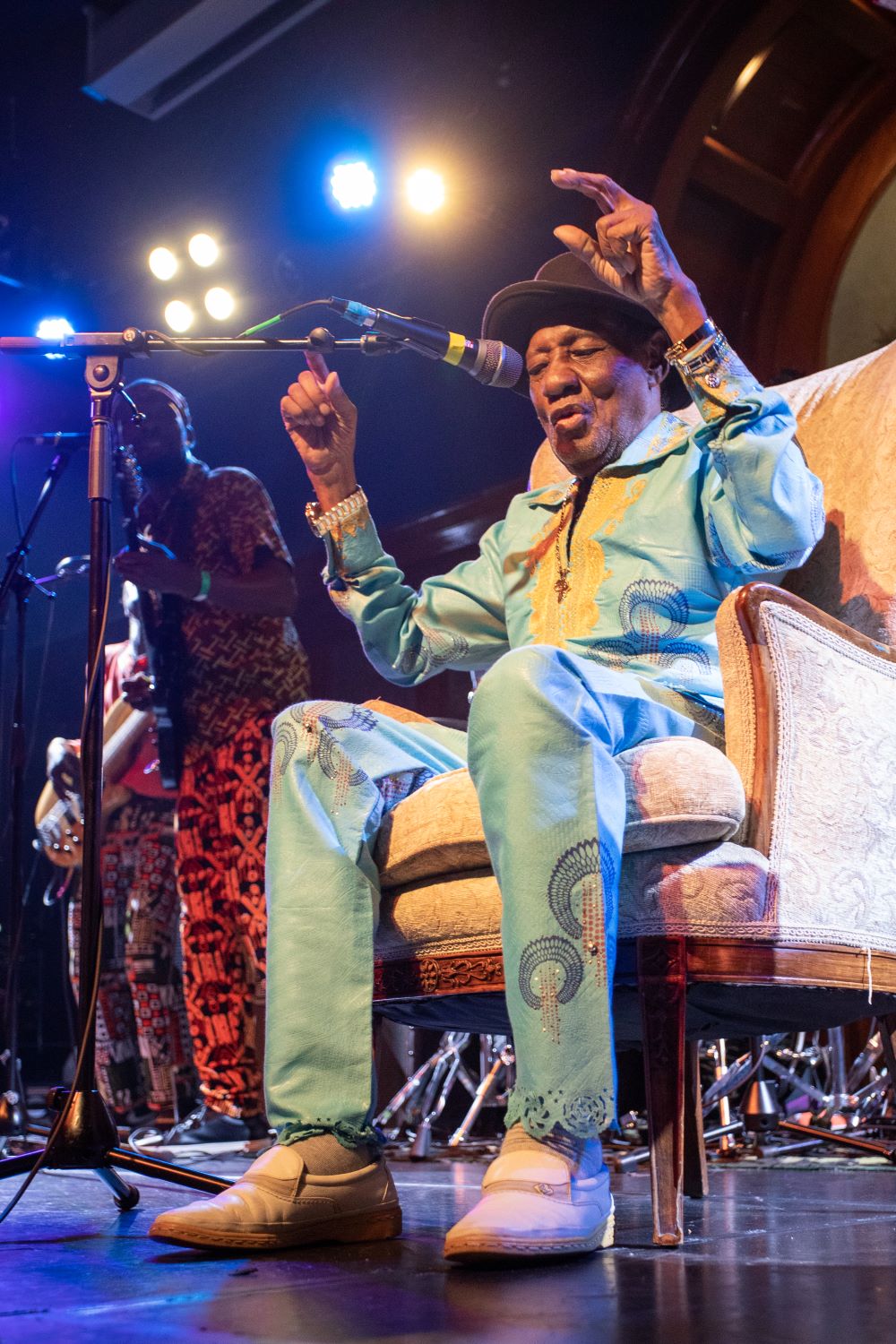Legendary Afrobeat Pioneer Ebo Taylor Releases New Album EBO TAYLOR JID022 in
Collaboration with Jazz Is Dead Founders Adrian Younge and Ali Shaheed Muhammad
Ebo Taylor JID022, Available January 31st, 2025 via Jazz Is Dead
At 88 years of age, the Ghanian highlife and afrobeat pioneer Ebo Taylor traveled to the US for the very first time to perform at the now iconic Jazz Is Dead concert series, selling out venues across the country. It was during this time that Ebo recorded a psychedelic afrobeat album alongside Jazz Is Dead producers Adrian Younge & Ali Shaheed Muhammad. This mind-blowing collaboration is one that could not have been anticipated by Ebo fans worldwide and will surely satisfy connoisseurs of classic West African funk.
“Collaborating with Ebo Taylor is definitely a bucket-list accomplishment. For me, it is the equivalent of working with musical genius Fela Kuti, because of how much I have studied both of their work and influence on the genre of Afrobeat. Seriously, recording the genius to analog tape while highlighting the raw recording styles of 1970s Africa is a dream I never thought could come to reality! It was also great to work with Ebo’s son, Henry Taylor, who is a true musical force in his own right.” – Adrian Younge
The swirling horns and gritty guitars heard on Ebo Taylor JID022 are reminiscent of his seminal seventies recordings that made him one of Africa’s most prolific and revolutionary artists of all time. Recorded inside of Younge’s Linear Labs studio, this album captures polyrhythmic percussion and twangy, fuzzed out guitars that prove that rhythm is key. The ensemble of Ghanian background vocalists emanates a uniquely spiritual sound that takes the listener back to Ebo’s prime.
However, one of the most exhilarating components to this album is Ebo’s signature approach to vocal stylings. His heartfelt lyrics about love, peace and spirituality echo decades of experience and wisdom. Songs such as “Beye Bu, Beye Ba” demonstrate how God provides for his people as songs like “Kusi Na Sibo” teach life lessons on gratitude. This is an afrobeat classic that stands as a true highlight in the canon of Ebo Taylor’s undeniable catalog and a crown jewel in the Jazz Is Dead library.
Ebo Taylor JID022 is set to be released just in time for Ebo’s highly anticipated live tour of The Americas presented by Jazz Is Dead. Ebo will be joined by the Ebo Taylor Family Band alongside his protégée and Ghanian legend Pat Thomas. Dates for this tour through The United States, Canada, Mexico and Brazil can be found on Jazz Is Dead’s site, link below.
Ebo Taylor JID022 · Ebo Taylor, Adrian Younge & Ali Shaheed Muhammad
Jazz Is Dead | Release Date: October 25, 2024
For all inquiries, please contact: Jazz Is Dead – info@jazzisdead.co
For more information and press materials (including album covers, promotional photos and bios)
please visit: JazzIsDead.co | Instagram
Ebo Taylor Bio
Born in 1936, Ghanaian guitarist, composer, arranger, bandleader, and producer Ebo Taylor has been a vital presence in African music for more than half-a-century. During the early ’60s, he was active in the influential highlife bands the Stargazers and the Broadway Dance Band whose singles were mainstays on national radio. In 1962 he took his Black Star Highlife Band to London and collaborated with other African musicians who were also in Britain at the time, including Fela Kuti. Back in Ghana, he worked as an influential producer, crafting recordings for Pat Thomas (his future collaborator) and C.K. Mann, among many others. During the ’70s, his own musical projects combined traditional Ghanaian music with Afrobeat, jazz, and funk, creating a trademark sound as evidenced by the albums Ebo Taylor & the Pelikans (1976) and Twer Nyame (1978). In the ’80s, albums such as Conflict Nkru! and Hitsville Re-Visited (cobilled to Thomas) by his Uhuru-Yenzu band delivered a rawer, more immediate sound. Over the next two decades, Taylor was a noted producer, arranger, and composer, working with Thomas, Mann, Gyedu-Blay Ambolley, Kofi Yankson, and dozens of others. He returned to performing live in the early 21st century after hip-hop producers began sampling his work. Soundways Records released the compilation Ghana Special. In 2010, Strut Records released Love and Death, his first internationally distributed album, followed by a series of catalog reissues and all-new recordings including 2018’s Yen Ara.
Taylor was born in Ghana and grew up on the sounds of the wartime big bands. His father nudged him into music, by encouraging his son to learn to play the family organ. He caught the music bug and began studying guitar in school, coming under the sway of the emergent highlife movement. He would soon lead his first group, an eight-piece band named the Stargazers. In 1962, he departed his native Ghana for London to study at the London Eric Gilder School of Music. He explored jazz, funk, and soul alongside fellow student Fela Kuti and future Osibisa bandmembers Teddy Osei and Sol Amarfio. They indulged in endless jam sessions in jazz clubs off Oxford Street, after which Fela would often join Taylor in his flat in Willesden Junction. They would listen to jazz records for hours, analyzing the structure and chord progressions of Miles Davis and Charlie Parker. During his time abroad, Taylor founded the Black Star Highlife Band, which showcased one of his greatest contributions to highlife: His jazz-inspired horn
arrangements.
After returning to Ghana, Taylor became an in-house arranger and producer for labels like Essiebons, working with other leading Ghanaian stars including Mann and Thomas. He was paid to write for them, play guitar on sessions, and supervise recordings. From the ’70s through the ’80s, Taylor cut a host of his own solo albums that offered idiosyncratic but very popular fusions of traditional Ghanaian sounds, Afrobeat, jazz, soul, and funk on albums such as My Love and Music, Twer Nyame, and Me Kra Tsie. His single “Heaven” from this period stands among the most revered Ghanaian Afrobeat tunes of the era. Taylor formed Uhuru-Yenzu in 1980 and released the albums Conflict Nkru! Nsamanfo: People’s Highlife, Vol. 1, and Hitsville Re-Visited (the latter co-billed to Thomas). After the album Pat Thomas & Ebo Taylor in 1984, the guitarist stopped recording and touring and focused instead on producing, arranging, and
composing for dozens of other artists.
In 2008, Taylor met the Berlin-based musicians of the Berlin Afrobeat Academy, including saxophonist Ben Abarbanel-Wolff. A year later, Usher sampled “Heaven” for his hit “She Don’t Know” (feat. Ludacris). In 2010, Taylor teamed with Berlin Afrobeat Academy for Love and Death on Strut Records, his first internationally distributed album. It offered re-recordings of his highlife and Afrobeat hits. Its success prompted Strut to issue the stellar retrospective Life Stories: Highlife & Afrobeat Classics 1973-1980 in the spring of 2011. In 2012, a third Strutalbum, the deeply personal Appia Kwa Bridge, appeared and showed that at 76, Taylor was still intensely creative and forceful, mixing traditional Fante songs and chants with children’s rhymes and personal matters into his own sharp vision of highlife.
That record marked the beginning of a popular renaissance for Taylor around the world. Early singles and other tracks appeared on several compilations over the next few years, and in 2015, his rarest album, Ebo Taylor & the Pelikans, got the grand reissue treatment. His early hit, the Ghana funk anthem “Come Along,” made DJ playlists globally. In February 2016, at age 80, he opened the MOGO Festival’s Nights with Music Greats. The gig proved to be a precursor for the deluxe reissue of his 1975 album, My Love and Music, on Mr. Bongo. In 2018, Taylor issued the album Yen Ara that saw him translating various strains of Fante music through contemporary Ghanaian highlife and experimenting with new rhythmic forms through horn-dominated compositions. At age 82, he supported it with a world tour. The following year, Mr. Bongo reissued Hitsville Re-Visited in May, while BBE Music released the Palaver album in September, that contained five unissued tracks from a (previously unknown) lost 1980 session. ~ Thom Jurek, Rovi


